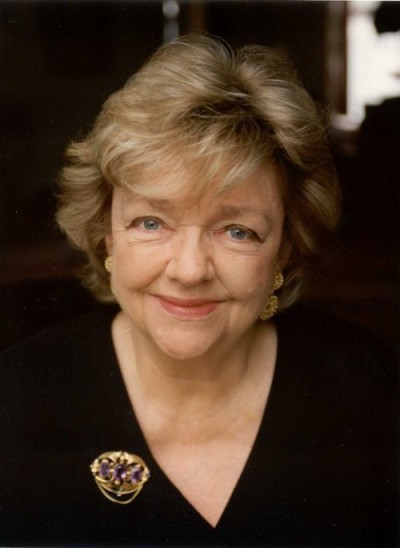Maeve Binchy (Maeve Binchy)

Binchy was born on 28 May 1940 in Dalkey, County Dublin (modern-day Dún Laoghaire–Rathdown), Ireland, the oldest child of four. Her siblings include one brother, William Binchy, Regius Professor of Laws at Trinity College, Dublin, and two sisters: Renie (who predeceased Binchy) and Joan Ryan. Her uncle was the historian D. A. Binchy (1899–1989). Educated at the Holy Child Convent in Killiney and University College Dublin (where she earned a bachelor’s degree in history), she worked as a teacher of French, Latin, and history at various girls’ schools, then a journalist at The Irish Times, and later became a writer of novels, short stories, and dramatic works. In 1968, her mother died of cancer aged 57. After Binchy’s father died in 1971, she sold the family house and moved to a bedsit in Dublin.
Binchy, described as “six feet tall, rather stout, and garrulous”, confided to Gay Byrne of The Late Late Show that, growing up in Dalkey, she never felt herself to be attractive; “as a plump girl I didn’t start on an even footing to everyone else”. After her mother’s death, she expected to lead a life of spinsterhood, or as she expressed: “I expected I would live at home, as I always did.” She continued, “I felt very lonely, the others all had a love waiting for them and I didn’t.” She ultimately encountered the love of her life, however; when recording a piece for Woman’s Hour in London she met children’s author Gordon Snell, then a freelance producer with the BBC. Their friendship blossomed into a cross-border romance, with her in Ireland and him in London, until she eventually secured a job in London through the Irish Times. She and Snell married in 1977 and, after living in London for a time, moved to Ireland. They lived together in Dalkey, not far from where she had grown up, until Binchy’s death.
Files in Ireland’s National Archives, released to the public in 2006, feature a request from Maeve Binchy to President Cearbhall Ó Dálaigh asking if he could “receive” her. She wrote, “I know you are extremely busy but I often see in the paper that you ‘received’ so-and-so and was wondering very simply could I be received too.” This request came while she was working for The Irish Times in London in 1975. In 2002, Binchy “suffered a health crisis related to a heart condition”, which inspired her to write Heart and Soul. The book about (what Binchy terms) “a heart failure clinic” in Dublin and the people involved with it, reflects many of her own experiences and observations in the hospital. Towards the end of her life, Binchy had the following message on her official website: “My health isn’t so good these days and I can’t travel around to meet people the way I used to. But I’m always delighted to hear from readers, even if it takes me a while to reply.” She suffered with severe arthritis, which left her in constant pain. As a result of the arthritis she had a hip operation.
Binchy died on 30 July 2012. She was 72 and succumbed after a short illness. Gordon was by her side when she died in a Dublin hospital. Just ahead of that evening’s Tonight with Vincent Browne and TV3’s late evening news, Vincent Browne and then Alan Cantwell, who respectively anchor these shows, announced to Irish television viewers that Binchy had died earlier that evening.
Immediate media reports described Binchy as “beloved”, “Ireland’s most well-known novelist” and the “best-loved writer of her generation”. Fellow writers mourned their loss, including Ian Rankin, Jilly Cooper, Anne Rice, and Jeffrey Archer. Politicians also paid tribute. President Michael D. Higgins stated: “Our country mourns.” Taoiseach Enda Kenny said, “Today we have lost a national treasure.” Minister of State for Disability, Equality and Mental Health Kathleen Lynch, appearing as a guest on Tonight with Vincent Browne, said Binchy was, for her (Lynch’s) money, as worthy an Irish writer as James Joyce or Oscar Wilde, and praised her for selling so many more books than they managed. In the days after her death tributes were published from such writers as John Banville, Roddy Doyle, and Colm Tóibín. Banville contrasted Binchy with Gore Vidal, who died the day after her, observing that Vidal “used to say that it was not enough for him to succeed, but others must fail. Maeve wanted everyone to be a success.” Numerous tributes appeared in publications on both sides of the Atlantic, including The Guardian and CBC News.
Shortly before her death, Binchy told The Irish Times: “I don’t have any regrets about any roads I didn’t take. Everything went well, and I think that’s been a help because I can look back, and I do get great pleasure out of looking back … I’ve been very lucky and I have a happy old age with good family and friends still around.” Just before dying, she read her latest short story at the Dalkey Book Festival. She once said she would like to die “… on my 100th birthday, piloting Gordon and myself into the side of a mountain”. Her funeral service took place, at the Church of assumption in her hometown of Dalkey. She was later cremated at Mount Jerome Cemetery and Crematorium.
Born
- May, 28, 1940
- Dalkey, Ireland
Died
- July, 30, 2012
- Dublin, Ireland



